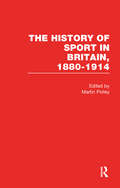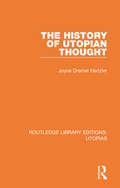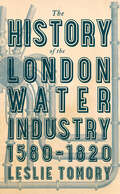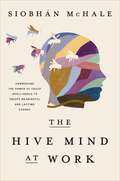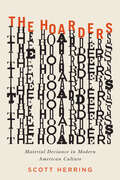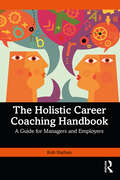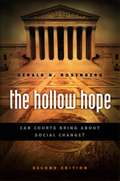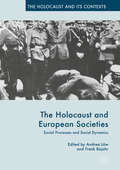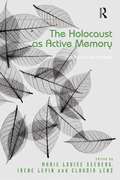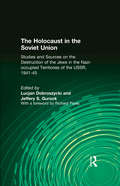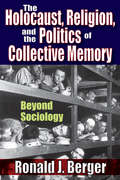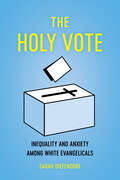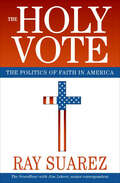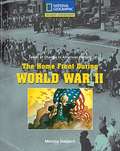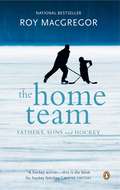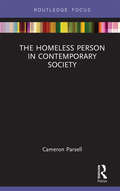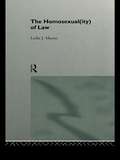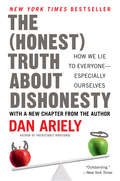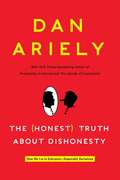- Table View
- List View
The History of Sport in Britain 1880-1914 V4
by Martin PolleyFirst published in 2004. This five-volume major work is a comprehensive collection of primary sources which examine changing attitudes to sport in the late Victorian and Edwardian eras. At the beginning of the period few sports were regulated, but by the outbreak of the First World War organized sport had become an integral part of British cultural, social and economic life. Martin Polley has collected articles from a wide range of journals including Blackwood's Magazine, Nineteenth Century, Fortnightly Review and Contemporary Review, which reveal changing middle-class attitudes to sport. The five volumes cover the varieties of sport being promoted, sport and education, commercial and financial aspects of sport, sport and animals and the globalization of sport through empire. Volume 4 includes sport money- looking at the areas of professionalism and amateurism, as well as gambling.
The History of Utopian Thought (Routledge Library Editions: Utopias)
by Joyce Oramel HertzlerThis book, originally published in 1923, embodies two related and yet distinct types of sociological endeavour. It is a study in the history of social thought, a field which had only been receiving serious and widespread attention in recent years, and attempts to give an historical cross-section of representative Utopian thought at the time. But it is also a study in social idealism, a study in the origin, selection and potency of those social ideas and ideals that occasional and usually exceptional men conceive, with particular emphasis upon their relation to social progress. It was the first book that attempted to give an unprejudiced, systematic treatment of the social Utopias as a whole.
The History of the London Water Industry, 1580–1820
by Leslie TomoryThis in-depth study explores the technological, cultural, and mercantile factors behind the infrastructure that transformed early modern London.Beginning in 1580, a number of competing London companies sold water directly to consumers through a large network of wooden mains in the expanding metropolis. This new water industry flourished throughout the 1600s, eventually expanding to serve tens of thousands of homes. By the late eighteenth century, more than 80 percent of the city’s houses had water connections—making London the best-served metropolis in the world while demonstrating that it was legally, commercially, and technologically possible to run an infrastructure network within the largest city on earth.Historian Leslie Tomory shows how an explosion of consumer demand and new technologies imported from the Continent spurred the rapid growth of London’s water industry. Meanwhile, several key local innovations reshaped the industry by enlarging the size of the supply network. By 1800, the success of London’s water industry made it a model for cities across Europe and beyond. It even inspired builders of other large-scale urban projects, including gas and sewage supply networks.
The Hive Mind at Work: Harnessing the Power of Group Intelligence to Create Meaningful and Lasting Change
by Siobhan McHaleLearn a new model for understanding how organizations really operate and implement changes that get real results.With so many forces of change buffeting the business world today, a scary state of flux has replaced any sense of certainty, stability, and familiarity, delivering a wake-up call to make crucial changes happen, make them happen quickly, and make them stick. Traditional approaches to change management fall into one of two categories: Organizations function like machines, where managers pull change levers to &“fix&” problems with an engineer&’s mindset (IQ). Or People form social networks wherein individual &“influencers&” make change happen by developing effective interpersonal relationships (EQ). Neither of these models offer a full picture to what really happens in an organization.In this groundbreaking new book, change expert Siobhan McHale offers a third option: organizations are complex ecosystems that require a Hive Mind or Group Intelligence (GQ) to bring about meaningful and lasting change. We can learn a lot of lessons from how bees operate:Hard work: An individual bee spends its entire 40-day life span gathering food for the hive.Teamwork: Inside each teeming beehive an entire community works collectively to achieve shared goals.Role clarity: Every bee has a specific job, with the queen, drones, and worker bees faithfully playing their part.Resilience: Bees can overcome daunting challenges, including all the parasites, pathogens, pesticides, and climate fluctuations from Maine to Miami and beyond.See how a hive mindset solves many of the common problems all businesses struggle with today!
The Hoarders: Material Deviance in Modern American Culture
by Scott HerringThe verb “declutter” has not yet made it into the Oxford English Dictionary, but its ever-increasing usage suggests that it’s only a matter of time. Articles containing tips and tricks on how to get organized cover magazine pages and pop up in TV programs and commercials, while clutter professionals and specialists referred to as “clutterologists” are just a phone call away. Everywhere the sentiment is the same: clutter is bad. In The Hoarders, Scott Herring provides an in-depth examination of how modern hoarders came into being, from their onset in the late 1930s to the present day. He finds that both the idea of organization and the role of the clutterologist are deeply ingrained in our culture, and that there is a fine line between clutter and deviance in America. Herring introduces us to Jill, whose countertops are piled high with decaying food and whose cabinets are overrun with purchases, while the fly strips hanging from her ceiling are arguably more fly than strip. When Jill spots a decomposing pumpkin about to be jettisoned, she stops, seeing in the rotting, squalid vegetable a special treasure. “I’ve never seen one quite like this before,” she says, and looks to see if any seeds remain. It is from moments like these that Herring builds his questions: What counts as an acceptable material life—and who decides? Is hoarding some sort of inherent deviation of the mind, or a recent historical phenomenon grounded in changing material cultures? Herring opts for the latter, explaining that hoarders attract attention not because they are mentally ill but because they challenge normal modes of material relations. Piled high with detailed and, at times, disturbing descriptions of uncleanliness, The Hoarders delivers a sweeping and fascinating history of hoarding that will cause us all to reconsider how we view these accumulators of clutter.
The Hobbled Giant: Essays On The World Bank
by Stanley PleaseFirst published in 1984. In these essays, Stanley Please contends that the World Bank is constrained in its ability to use its position and .power in the interests of more rapid development of the poorer countries of the world. These constraints derive in large part from the legal restriction on the Bank to engage primarily in project lending and from the division of responsibility between the ·Bank and its sister institution, the International Monetary Fund (IMF). Although the Bank's financing of projects and investment programs has made a significant contribution, Mr. Please argues that greater Bank involvement in national policy formation can greatly benefit economic development. He looks at ways to increase cooperation between the Bank and the IMF, examines the policy work the Bank has done in the past and assesses the capacity of the Bank for policy formation, evaluates the need for it to do more such work, and discusses the likely responses of developing and developed countries to these changes
The Holistic Career Coaching Handbook: A Guide for Managers and Employers
by Rob NathanExclusion from the workplace not only has devastating effects on individual well-being and public health, but also limits organisational development and social cohesion. This book promotes an understanding of the strengths of people with diverse attributes, transforming a sense of being overlooked by employers to being a valued asset.This handbook provides tools for people to respond respectfully to the way employees experience their working lives. It guides the reader to realise the potential strengths of employees, regardless of their background, life situation, mental health or neurological condition, and appreciate the impact of emotions on their contribution to and experience of work. Other books look at organisational reasons for motivation; this book addresses the emotional effect of significant change outside the workplace that has an impact on motivation at work. Chapters cover neurodiversity, parental coaching, Career Returners, menopause and the impact of different life stages.This practical book uses cases and summaries throughout and has chapters on creating a successful programme of career support, together with 15 original Career Tools. It is particularly relevant to Human Resources, Learning and Development, and line managers, and anyone wanting to develop effective in-house career coaching for employees.
The Hollow Hope: Can Courts Bring About Social Change? (2nd edition)
by Gerald N. RosenbergIn follow-up studies, dozens of reviews, and even a book of essays evaluating his conclusions, Gerald Rosenberg's critics-- not to mention his supporters-- have spent nearly two decades debating the arguments he first put forward in The Hollow Hope. With this substantially expanded second edition of his landmark work, Rosenberg himself steps back into the fray, responding to criticism and adding chapters on the same-sex marriage battle that ask anew whether courts can spur political and social reform. Finding that the answer is still a resounding no, Rosenberg reaffirms his powerful contention that it's nearly impossible to generate significant reforms through litigation. The reason? American courts are ineffective and relatively weak-- far from the uniquely powerful sources for change they're often portrayed as. Rosenberg supports this claim by documenting the direct and secondary effects of key court decisions-- particularly Brown v. Board of Education and Roe v. Wade. He reveals, for example, that Congress, the White House, and a determined civil rights movement did far more than Brown to advance desegregation, while pro-choice activists invested too much in the expense of political mobilization. Further illuminating these cases, as well as the on going fight for same-sex marriage rights, Rosenberg also marshals impressive evidence to overturn the common assumption that even unsuccessful litigation can advance a cause by raising its profile. Directly addressing its critics in a new conclusion, The Hollow Hope, Second Edition promises to reignite for a new generation the national debate it sparked seventeen years ago.
The Holocaust and European Societies
by Frank Bajohr Andrea LöwThis book explores the Holocaust as a social process. Although the mass murder of European Jews was essentially the result of political-ideological decisions made by the Nazi state leadership, the events of the Holocaust were also part of a social dynamic. All European societies experienced developments that led to the social exclusion, persecution and murder of the continent's Jews. This volume therefore questions Raul Hilberg#65533;s category of the 'bystander'. In societies where the political order expects citizens to endorse the exclusion of particular groups in the population, there cannot be any completely uninvolved bystanders. Instead, this book examines the multifarious forms of social action and behaviour connected with the Holocaust. It focuses on institutions and persons, helpers, co-perpetrators, facilitators and spectators, beneficiaries and profiteers, as well as Jewish victims and Jewish organisations trying to cope with the dynamics of exclusion and persecution.
The Holocaust and the Revival of Psychological History
by Judith M. HughesWhy did men and women in one of the best educated countries in the Western world set out to get rid of Jews? In this book, Judith M. Hughes focuses on how historians' efforts to grapple anew matters of actors' meanings, intentions, and purposes have prompted a return to psychoanalytically informed ways of thinking. Hughes makes her case with fine-grained analyses of books by Hugh Trevor-Roper, Ian Kershaw, Daniel Goldhagen,Saul Friedländer, Christopher Browning, Jan Gross, Hannah Arendt, and Gitta Sereny. All of the authors pose psychological questions; the more astute among them shed fresh light on the Holocaust - without making the past any less disturbing.
The Holocaust as Active Memory: The Past in the Present
by Irene LevinThe ways in which memories of the Holocaust have been communicated, represented and used have changed dramatically over the years. From such memories being neglected and silenced in most of Europe until the 1970s, each country has subsequently gone through a process of cultural, political and pedagogical awareness-rising. This culminated in the ’Stockholm conference on Holocaust commemoration’ in 2000, which resulted in the constitution of a task force dedicated to transmitting and teaching knowledge and awareness about the Holocaust on a global scale. The silence surrounding private memories of the Holocaust has also been challenged in many families. What are the catalysts that trigger a change from silence to discussion of the Holocaust? What happens when we talk its invisibility away? How are memories of the Holocaust reflected in different social environments? Who asks questions about memories of the Holocaust, and which answers do they find, at which point in time and from which past and present positions related to their societies and to the phenomenon in question? This book highlights the contexts in which such questions are asked. By introducing the concept of ’active memory’, this book contributes to recent developments in memory studies, where memory is increasingly viewed not in isolation but as a dynamic and relational part of human lives.
The Holocaust in the Soviet Union: Studies and Sources on the Destruction of the Jews in the Nazi-occupied Territories of the USSR, 1941-45
by Lucjan Dobroszycki Jeffery S. GurockIn this volume, scholars from the United States, Israel and Eastern Europe examine the history of the Holocaust on Soviet territory and its treatment in Soviet politics and literature from 1945 to 1991. Of special interest to researchers will be chapters on some of the major research sources for historical study, including census materials, memorial books, archives and recently released documents.
The Holocaust, Religion, and the Politics of Collective Memory: Beyond Sociology
by Ronald J. BergerThe program of extermination Nazis called the Final Solution took the lives of approximately six million Jews, amounting to roughly 60 percent of European Jewry and a third of the world's Jewish population. Studying the Holocaust from a sociological perspective, Ronald J. Berger explains why the Final Solution happened to a particular people for particular reasons; why the Jews were, for the Nazis, the central enemy. Taking a unique approach in its examination of the devastating event, The Holocaust, Religion, and the Politics of Collective Memory fuses history and sociology in its study of the Holocaust.Berger's book illuminates the Holocaust as a social construction. As historical scholarship on the Holocaust has proliferated, perhaps no other tragedy or event has been as thoroughly documented. Yet sociologists have paid less attention to the Holocaust than historians and have been slower to fully integrate the genocide into their corpus of disciplinary knowledge and realize that this monumental tragedy affords opportunities to examine issues that are central to main themes of sociological inquiry.Berger's aim is to counter sociologists who argue that the genocide should be maintained as an area of study unto itself, as a topic that should be segregated from conventional sociology courses and general concerns of sociological inquiry. The author argues that the issues raised by the Holocaust are central to social science as well as historical studies.
The Holy Vote: Inequality and Anxiety among White Evangelicals
by Sarah DiefendorfThrough two years of ethnographic fieldwork at a megachurch, sociologist Sarah Diefendorf investigates the ways in which the evangelical church is working to grow during a time in which cultural shifts are leading young people to leave religion behind. In order to expand, the church has revisited topics long understood as external threats to the organization, such as feminism, gender equality, racial inclusivity, and queer life—topics Diefendorf classifies as the "imagined secular" in the minds of evangelicals.The Holy Vote shows, however, that the church continues to uphold already privileged identities even as it reworks its messages to appear more welcoming, offering insight into how White evangelical understandings about sex and families have shaped a political movement that has helped remake the Republican Party and transform American politics. In this enlightening work, Diefendorf highlights the complex origins of these understandings and considers their intersections with contemporary culture and enduring social inequalities.
The Holy Vote: The Politics of Faith in America
by Ray SuarezNot since the Civil War has the United States been so polarized, politically and ideologically. At the heart of this fracture is a fascinating, paradoxical marriage between our country's politics and religions.In The Holy Vote, Ray Suarez explores the advent of this polarization and how it is profoundly changing the way we live our lives. With hands-on reporting, Suarez explores the attitudes and beliefs of the people behind the voting numbers and how the political divide is manifesting itself across the country. The reader will come to a greater understanding of what Americans believe, and how this belief structure fuels the debates that dominate the issues on our evening news broadcasts.
The Home Front During World War II
by Monica HalpernThe book talks about how War changed daily life in America.Food, clothing,and housing were not the only worries Americans at home had as the bombing of Pearl Harbor made them fear for their own safety.
The Home Front in Britain
by Maggie Andrews Janis LomasThe Home Front in Britain explores the British Home Front in the last 100 years since the outbreak of WW1. Case studies critically analyse the meaning and images of the British home and family in times war, challenging prevalent myths of how working and domestic life was shifted by national conflict.
The Home Team
by Roy MacgregorShortlisted for the Governor General's Award"A truly magnificent book."--Calgary Herald It's the great Canadian icon: a frozen creek, a backyard rink, a father passing something precious on to his child--the love of a game. There is nothing quite so Canadian as hockey, and nothing quite so evocative in hockey as the relationships between Canadian hockey players and their fathers. Here are the personal tales of Wayne Gretzky, Mark Messier, Paul Coffey and Marty McSorley, told as the four NHL stars take their fathers on a hockey tour of Europe. Here are the memories of hockey's grand families: Gordie, Mark and Travis Howe; Bill, Kevin and Gord Dineen; Murray, Ken and Michael Dryden. Here is Brett Hull's story of the famous father who was never home. But The Home Team is about more than famous names. It is the story of the father and son left weeping in the stands at the end of a disappointing draft day. It is the story of a minor league coach and his house league son. This book is about hockey. It is also about where we live and who we are: a book for all fathers and sons in Canada.
The Home in the Digital Age (Routledge Advances in Sociology)
by Antonio ArgandoñaThe Home in the Digital Age is a set of multidisciplinary studies exploring the impact of digital technologies in the home, with a shift of emphasis from technology to the people living and using this in their homes.The book covers a wide variety of topics on the design, introduction and use of digital technologies in the home, combining the technological dimension with the cognitive, emotional, cultural and symbolic dimensions of the objects that incorporate digital technologies and project them onto people’s lives. It offers a coherent approach, that of the home, which gives unity to the discussion.Scholars of the home, the house and the family will find here the connection with the problems derived from the use of domestic robots and connected devices. Students of artificial intelligence, machine learning, robotics, big data and other branches of digital technologies will find ideas and arguments to apply their disciplines to the home and participate fruitfully in forums where digital technologies are built and negotiated in the home. Experts from various disciplines ・ psychologists and sociologists; philosophers, epistemologists and ethicists; economists; engineers, architects, urban planners and designers and so on ・ and also those interested in developing policies for the home and family will find this book contains well-founded and useful ideas to focus their work.
The Homeless
by Christopher JencksHow widespread is homelessness, how did it happen, and what can be done about it? These are the questions explored by Christopher Jencks, America's foremost analyst of social problems. Jencks examines the standard explanations and finds that the deinstitutionalization of the mentally ill, the invention of crack cocaine, rising joblessness among men, declining marriage rates, cuts in welfare benefits, and the destruction of skid row have all played a role. Changes in the housing market have had less impact than many claim, however, and real federal housing subsidies actually doubled during the 1980s. Not confining his mission to studying the homeless, Jencks proposes several practical approaches to helping the homeless.
The Homeless Person in Contemporary Society
by Cameron ParsellThe homeless person is thought to be different. Whereas we get to determine our difference or sameness, the homeless person’s difference is imposed upon them and assumed to be known because of their homelessness. Exclusion from housing – either a commodity that should be accessed from the market or social provision – signifies the homeless person’s incapacities and failure to function in what are presented as unproblematic social systems. Drawing on a program of research spanning ten years, this book provides an empirically grounded account of the lives and identities of people who are homeless. It illustrates that people with chronic experiences of homelessness have relatively predictable biographies characterised by exclusion, poverty, and trauma from early in life. Early experiences of exclusion continue to pervade the lives of people who are homeless in adulthood, yet they identify with family and normative values as a means of imaging aspirational futures.
The Homeschool Choice: Parents and the Privatization of Education (Critical Perspectives on Youth)
by Kate Henley AverettHonorable Mention, Sex & Gender Section Distinguished Book Award, given by the American Sociological AssociationThe surprising reasons parents are opting out of the public school system and homeschooling their kidsHomeschooling has skyrocketed in popularity in the United States: in 2019, a record-breaking 2.5 million children were being homeschooled. In The Homeschool Choice, Kate Henley Averett provides insight into this fascinating phenomenon, exploring the perspectives of parents who have chosen to homeschool their children. Drawing on in-depth interviews, Averett examines the reasons why these parents choose to homeschool, from those who disagree with sex education and LGBT content in schools, to others who want to protect their children’s sexual and gender identities. With eye-opening detail, she shows us how homeschooling is a trend being chosen by an increasingly diverse subset of American families, at times in order to empower—or constrain—children’s gender and sexuality. Ultimately, Averett explores how homeschooling, as a growing practice, has changed the roles that families, schools, and the state play in children’s lives. As teachers, parents, and policymakers debate the future of public education, The Homeschool Choice sheds light on the ongoing struggle over school choice.
The Homosexual(ity) of law
by Leslie MoranFirst published in 1996. Routledge is an imprint of Taylor & Francis, an informa company.
The Honest Truth About Dishonesty: How We Lie to Everyone--Especially Ourselves (Ebook Bundle Ser.)
by Dan ArielyThe New York Times bestselling author of Predictably Irrational and The Upside of Irrationality returns with thought-provoking work to challenge our preconceptions about dishonesty and urge us to take an honest look at ourselves. Does the chance of getting caught affect how likely we are to cheat?How do companies pave the way for dishonesty?Does collaboration make us more honest or less so?Does religion improve our honesty?Most of us think of ourselves as honest, but, in fact, we all cheat. From Washington to Wall Street, the classroom to the workplace, unethical behavior is everywhere. None of us is immune, whether its the white lie to head off trouble or padding our expense reports. In The (Honest) Truth About Dishonesty, award-winning, bestselling author Dan Ariely turns his unique insight and innovative research to the question of dishonesty. Generally, we assume that cheating, like most other decisions, is based on a rational cost-benefit analysis. But Ariely argues, and then demonstrates, that its actually the irrational forces that we dont take into account that often determine whether we behave ethically or not. For every Enron or political bribe, there are countless puffed resumes, hidden commissions, and knockoff purses. In The (Honest) Truth About Dishonesty, Ariely shows why some things are easier to lie about; how getting caught matters less than we think; and how business practices pave the way for unethical behavior, both intentionally and unintentionally. Ariely explores how unethical behavior works in the personal, professional, and political worlds, and how it affects all of us, even as we think of ourselves as having high moral standards. But all is not lost. Ariely also identifies what keeps us honest, pointing the way for achieving higher ethics in our everyday lives. With compelling personal and academic findings, The (Honest) Truth About Dishonesty will change the way we see ourselves, our actions, and others.
The Honest Truth about Dishonesty: How We Lie to Everyone - Especially Ourselves
by Dan ArielyDan Ariely, behavioral economist and the New York Times bestselling author of The Upside of Irrationality and Predictably Irrational, examines the contradictory forces that drive us to cheat and keep us honest, in this groundbreaking look at the way we behave: The (Honest) Truth About Dishonesty. From ticket-fixing in our police departments to test-score scandals in our schools, from our elected leaders' extra-marital affairs to the Ponzi schemes undermining our economy, cheating and dishonesty are ubiquitous parts of our national news cycle-and inescapable parts of the human condition. Drawing on original experiments and research, in the vein of Freakonomics, The Tipping Point, and Survival of the Sickest, Ariely reveals-honestly-what motivates these irrational, but entirely human, behaviors.
